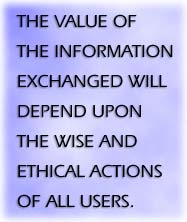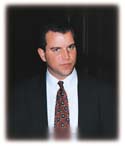


 round table discussion by top cyberspace experts in Washington, D.C., produced a consensus that current laws should protect copyrightsand intellectual property1 in cyberspace, and that on-line arbitration services could help to resolve disputes regarding these matters.
round table discussion by top cyberspace experts in Washington, D.C., produced a consensus that current laws should protect copyrightsand intellectual property1 in cyberspace, and that on-line arbitration services could help to resolve disputes regarding these matters.
Held on October 4 in the First Amendment room of the National Press Club, the roundtable featured Vinton Cerf, senior vice president of MCI, widely known as the “father of the Internet” and David Post and David Johnson, co-founders of the Cyberspace Law Institute of Georgetown University Law Center, among others.
Entitled “The Internet and Property Rights: What’s Mine Is Yours?,” discussion centered on the unique legal problems of intellectual property rights on the Net — compared by David Post to “a giant, worldwide copying machine” — where on-line theft of a book, article or manuscript can occur so rapidly that incalculable damage is done before the victim can take the matter to court. Even more insidious, violators then claim they cannot be singled out or held responsible for the theft as now “everyone has it.”
Sponsored by the Cyberspace Law Institute, the conference developed from conversations over the summer between Bill Burrington, assistant general counsel and director of government policy for America Online, and Janet Weiland, vice president of the Church of Scientology International, on the need to air views and ideas regarding intellectual properties on the Internet. It gained added impetus in light of a recent white paper on intellectual properties. (See “CopyrightClearance Center Goes Online”.)

|
|
|
Burrington, who also chairs the Public Policy Committee of the Interactive Services Association, an association of telecommunications firms which includes major on-line service providers, served as roundtable moderator.
“I do think that the medium [of the Internet] poses some serious challenges to us in protecting copyrights,” Vinton Cerf said in his opening remarks, “but I remind you that copyright law is intended to help people benefit from intellectual contributions whether it be those who receive them or those who produce them so as to encourage that kind of contribution on the Internet. I believe it is vital that we find a way to institute that same protection and encouragement for intellectual contribution in this new medium.
“When copyright laws were originally written, movies and sound recordings did not exist,” he said, “and yet we were able to adapt the intent of the law to deal with those technologies. So I think in this new medium, we should find a fair measure of adaptability.”
David Johnson advanced the idea that there ought to be a means to resolve conflicts involving intellectual property rights rapidly — without resorting to litigation. Individuals could be empowered to arbitrate disputes in the pre-litigation stage, he suggested. They could adjudicate complaints to access providers by copyright holders who felt their intellectual property rights were being violated by one of the access provider’s customers.
Access providers or system operators, such as America Online, Prodigy and CompuServe, could turn to the arbitrators for fast rulings on alleged copyright violations.
“There are legitimate complaints by copyright holders that their materials have been, without their consent, distributed throughout the Net and they ought to have some recourse” Johnson stated. The situation, he continued, “cries out for the creation of an intermediate process where you could refer the complaint to someone who understood cyberspace law. What we need to create here, and the Net itself may be well able to create within its own community, is a quick means to focus the dispute, give a preliminary assessment of how serious the claim is, and to give the system operator something to defer to that is essentially neutral and acceptable to the parties.”


With C-SPAN and other news media in attendance, participants expanded upon Johnson’s suggestion. Panelist Wayne Rash, a contributing editor and columnist for Communications Week, offered the term “Virtual Magistrate” to describe the role of arbitrator.
The value of arbitration panels became increasingly obvious. As later summarized by Rash, these bodies “could make decisions in real time [instantaneously], communicate by e-mail and remove material that violated copyrightsin a few hours.”
Moderator Bill Burrington noted that access providers would welcome the idea of arbitration: “We don’t want to be placed in the role of being the Net cop.”
Such arbitration boards would be avenues to which on-line services could turn for what David Johnson called a “smell test” regarding alleged copyright violations.
Panelist Helena Kobrin, counsel for the Church of Scientology International and Religious Technology Center, holder of the trademarks of the Scientology religion, noted that arbitration boards could cut down on the volume of ongoing litigation, and that use of arbitration could easily be provided for as part of contractual arrangements between on-line services and service providers and their users.

|
David Johnson, co-founder of the Cyberspace Law Institute of Georgetown University Law Center; at the roundtable discussion. |

“One of the hottest areas in the law right now is alternative dispute resolution,” she said. “Because everyone recognizes that the courts are overburdened, things don’t get through the courts expeditiously in most cases and there should be other ways that people can get their problems solved short of going to court.”
In an article about the roundtable, Carolyn Hirschman of Washington Business Journal wrote, “On-line services can’t possibly monitor postings that come from around the world 24 hours a day. Besides, they’re not copyright experts. Quick referral to a knowledgeable, neutral outsider may be the best course.”
Panelist Dan Duncan, vice president of government affairs, Information Industry Association, made a point that all speakers agreed upon: something needs to be done. “The anarchy that exists on the Net in the long run will not be beneficial to most people using the Net,” he said.

In an interview with Freedom, Vinton Cerf put the problem in perspective. “Every time you create a communications medium, some people will abuse it,” he said. “But by far, the bulk of the uses of these technologies would be positive. We have already seen some stunning examples of the utility of having a global-based computer system. Watching kids and teachers change the way they educate — it’s quite exciting. And it’s turned into a very valuable way of moving what had been far-flung families back together again.”
| Bill Burrington, vice president of America Online who also chairs the Public Policy Committee of the Interactive Services Association, an association of telecommunications firms which includes major on-line service providers, served as roundtable moderator. |

|
But the value of the information exchanged will depend upon the wise and ethical actions of all users. As Wayne Rash commented in his column, “If the world of on-line services becomes less respectful of intellectual property, and if those who would steal intellectual property find support and gratification, all who would use such services are ultimately hurt. Businesses that provide content will stay away. Services that provide information freely will close their systems.
“Ultimately, people who own intellectual property will lock it away rather than see it stolen. Then, when information is locked away, access to the global wealth we now enjoy will be lost forever.”
Intellectual property law remains an esoteric area that has evolved in response to technological change. While advances in technology generate new industries and new methods for reproducing and disseminating works of authorship and present additional opportunities for authors, they also create new challenges.Copyrightlaw has always responded to the challenges, from Gutenberg’s moveable-type printing press to digital audio recorders and everything in between — photocopiers, radio, television, videocassette recorders, cable television and satellites — and must, for the sake of creativity and intellectual freedom, continue to do so.

